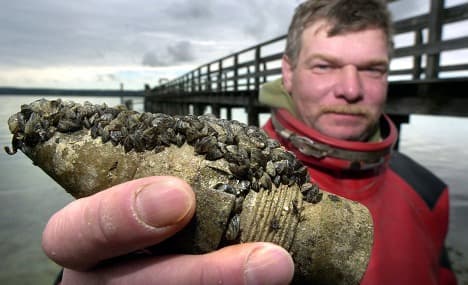World War II munitions litter Baltic and North Sea

More than 1.6 million tonnes of old war munitions remain at the bottom of the Baltic and North Seas in German waters, creating an ever-present danger for fishermen or workers laying pipeline in the region.
A government-sponsored working group produced the new report “Contaminated Munitions Sites in the Ocean,” which identified dozens of sites where large numbers of dangerous items, mostly from the World War II era, have been dumped. It said the problem is most severe in the North Sea, where at least 1.3 million tonnes of conventional and chemical munitions are at the bottom of the sea.
Officials warned that the full extent of the problem is unclear, particularly in the Baltic Sea, because many large munitions dumps have yet to be identified.
“Up to now, only a small portion of the affected areas are known,” said Tobias Knobloch of the Federal Maritime and Hydrographic Agency, adding that even documents showing where munitions might be located have large gaps in them.
In some cases, particularly in waters off Mecklenburg-Western Pomerania, data and facts on dumping were apparently never even written down.
And the old munitions can hurt people whose livelihood is made on the seas, Knobloch said.
“A risk can arise, for example for fisherman, if their nets come in contact with ammunition. Or through construction projects, such as the laying of a pipeline,” Knobloch said.
Chemical leakage can also occur, causing injuries and accidents. Leaks from white phosphorous incendiary bombs can wash up on shore and cause severe burns.
There are no easily solutions to dealing with the weapons problems, according to officials and the report. But it is hoped that raising awareness of the problem could pave the way for coordination between countries and new techniques to retrieve and dispose of old munitions.
The Local/DAPD/mdm
Comments
See Also
A government-sponsored working group produced the new report “Contaminated Munitions Sites in the Ocean,” which identified dozens of sites where large numbers of dangerous items, mostly from the World War II era, have been dumped. It said the problem is most severe in the North Sea, where at least 1.3 million tonnes of conventional and chemical munitions are at the bottom of the sea.
Officials warned that the full extent of the problem is unclear, particularly in the Baltic Sea, because many large munitions dumps have yet to be identified.
“Up to now, only a small portion of the affected areas are known,” said Tobias Knobloch of the Federal Maritime and Hydrographic Agency, adding that even documents showing where munitions might be located have large gaps in them.
In some cases, particularly in waters off Mecklenburg-Western Pomerania, data and facts on dumping were apparently never even written down.
And the old munitions can hurt people whose livelihood is made on the seas, Knobloch said.
“A risk can arise, for example for fisherman, if their nets come in contact with ammunition. Or through construction projects, such as the laying of a pipeline,” Knobloch said.
Chemical leakage can also occur, causing injuries and accidents. Leaks from white phosphorous incendiary bombs can wash up on shore and cause severe burns.
There are no easily solutions to dealing with the weapons problems, according to officials and the report. But it is hoped that raising awareness of the problem could pave the way for coordination between countries and new techniques to retrieve and dispose of old munitions.
The Local/DAPD/mdm
Join the conversation in our comments section below. Share your own views and experience and if you have a question or suggestion for our journalists then email us at [email protected].
Please keep comments civil, constructive and on topic – and make sure to read our terms of use before getting involved.
Please log in here to leave a comment.